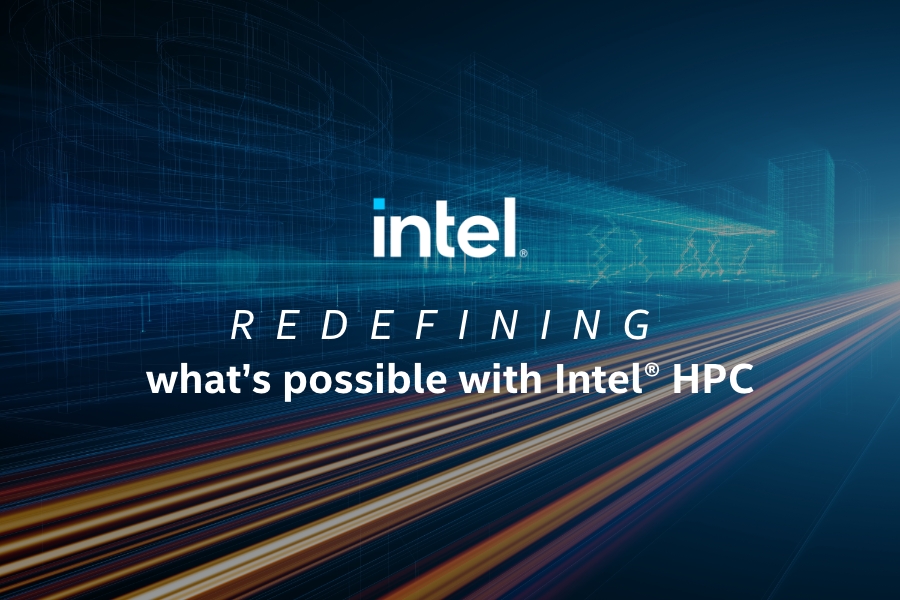Our latest blog looks at how Intel High Performance Computing (HPC) and 3rd Generation Xeon Scalable Processors are helping to drive critical advancements across a range of verticals markets.
An introduction to Intel HPC
With deep learning acceleration built directly into their chip, Intel® hardware is designed to support the convergence of AI and HPC. Intel® software, including a development toolkit and multi architecture programming model, plus a broad software ecosystem, helps to ensure HPC users get more value from their hardware and application investments.
Flexible, scalable HPC powers progress. Increasingly, HPC accelerates innovation in verticals like manufacturing, finance, life sciences, oil and gas, energy, and more. Powering the demands of these diverse HPC workloads requires flexibility, customisation, and the ability to scale.
3rd Generation Intel Xeon Scalable Processors
The latest 3rd Generation Intel® Xeon® Scalable processors deliver outstanding performance for diverse HPC and AI applications in fields like manufacturing, finance, life sciences and more. This helps businesses discover new ways to extract better performance from a wide range of workloads and ensure HPC applications perform at their best.
The latest 3rd Gen Intel® Xeon® Scalable processors deliver outstanding performance for challenging real-world HPC applications with significant improvements over the prior gen. Innovations in core architecture, increased memory bandwidth, built-in AI and HPC acceleration, and advanced security technologies enable users to minimise complexity and unleash the value of data.
The benefits of 3rd Generation Xeon Scalable Processors
Designed through decades of innovation and optimised for the most demanding workload requirements, on premise and in the cloud, these powerful, future-ready processors deliver:
• Flexible performance on real-world HPC workloads
• Enhanced performance using Intel’s newest processor architecture and 10nm process technology to boost a wide range of HPC applications
• Increased memory bandwidth, from six to eight channels, running at faster speeds
• Flexible configuration to set cores and frequencies to best match workload requirements with Intel® Speed Select Technology
How HPC redefines what’s possible
HPC plays a vital part in driving critical advancements across a wide range of vertical markets, with several drivers fueling growth in HPC such as the rise of cloud computing. This has made HPC more accessible to more users, providing the capability to process large volumes of data, serve more workloads, and run custom optimisations for greater efficiencies.
HPC continues to be a key tool for meeting real-time business challenges and solving the latest science questions. Traditionally it has been used in modelling and simulation, allowing comparison of complex computational models versus observed data, and to speed research and development for products and services. Now, new data-driven paradigms are heavily utilising HPC to derive deeper insights from ever-increasing amounts of data.
Additionally, the ongoing introductions of new hardware, algorithms, applications and use cases in machine and deep learning are generating interest in HPC systems capable of delivering fast performance for aggressive training, inferencing, and decision support tasks.
The insatiable demand for performance coupled with a need for flexibility today and in the future is raising the bar for HPC servers. There is a growing need for an open architecture that can support and be optimised for evolving and diversifying applications. This will create a system with CPUs that can be relied upon to quickly deploy a wide variety of applications while protecting data at-rest, in-flight, and in-use, without compromising privacy.
Streamlined deployment, faster time to value
Trusted and verified Intel® Select Solutions for HPC offer an easy and quick-to-deploy infrastructure optimised to help accelerate time to breakthrough, actionable insights, and new product designs.
Built-in AI and HPC acceleration for demanding workloads
The balanced architecture includes optimisations such as built-in acceleration, allowing organisations to deploy most of their AI/ML (artificial intelligence/machine learning) workloads on the Intel Xeon platforms they know and trust—not on expensive, proprietary add-in hardware.
If you would like to learn more, please contact us today at: servers@exertisenterprise.com

